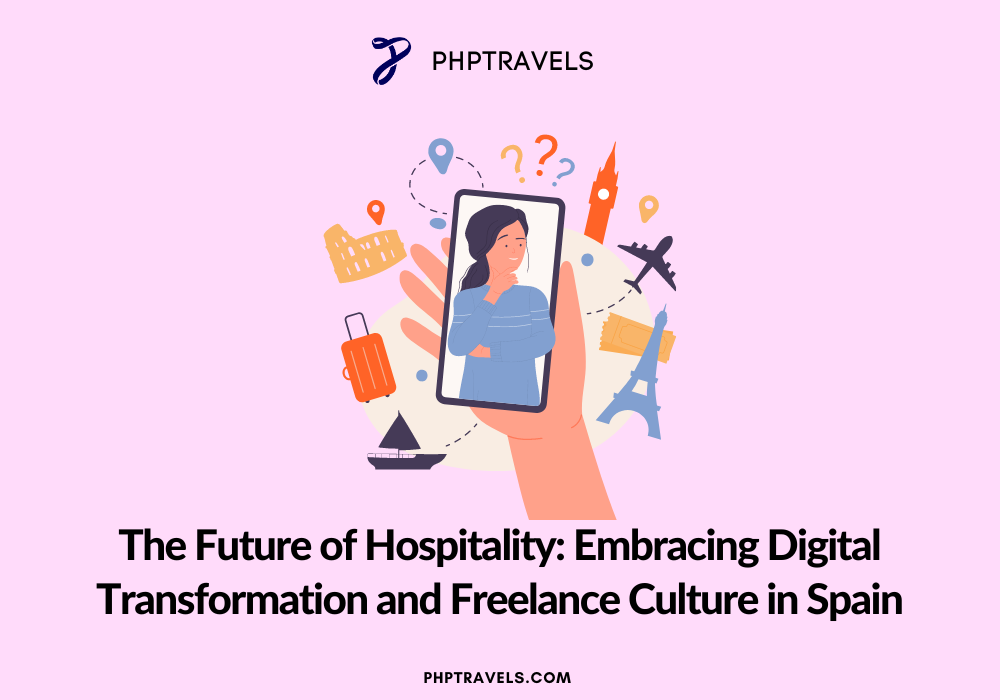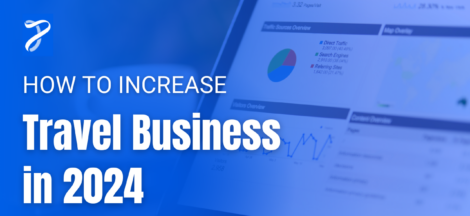Spain is the fifth-most visited country in the world and is slated to attract nearly 36,410,000 international tourists in 2023. While this staggering number of tourists will fuel the country’s economy as a whole, they’ll have the most impact on its hospitality segment.
Unsurprisingly, Spain’s hotel segment is the fifth-largest revenue contributor in Europe, generating almost €6.98 billion. As such, it houses international and national hospitality chains eager to serve each tourist who walks through their door.
But the future of hospitality in Spain remains uncertain amid a rapid digital transformation and the growth of freelance culture in the country.
How are Digital Transformation and Freelance Culture Shaping the Future of Hospitality in Spain?
Spain is the idealistic image of a perfect vacation. Consequently, its charming culture, mesmerizing beaches, pleasant weather, and mouth-watering delicacies are drawing tourists by the millions in the new normal and urging them to spend their hard-earned euros.
This incoming barrage of international tourists isn’t just vital to the country’s economy. It’s also responsible for sustaining over 11,000 hotel establishments in the country.
While, on the surface, the hospitality and tourism industry seems to be lining its pockets and enjoying unprecedented profits, a look behind the scenes reveals how this billion-euro market is struggling to keep up with the latest digital transformations. Moreover, the industry is plagued by a lack of skilled employees and tight budgets.
What does digitalization mean for the hospitality industry?
In theory, a hotel’s digital transformation refers to the increased use of technology and updating existing IT systems. Embracing digitization with open arms will translate to high costs for the hotels, but overhauling the IT infrastructure isn’t the hard part.
It’s undergoing a digital transformation successfully to build a sustainable business model. For a successful digital transformation, hotels must understand and acknowledge how integrating new technology will push them to modify their approach to business processes and people.
Although it sounds like a lot of work, reassessing company culture and developing a business model that considers Spain’s emerging freelance labor market will chart the path for a hotel’s successful digital transformation.
Additionally, partnering with skilled technical freelancers in Spain will help the hospitality industry enjoy all the benefits of a full-time employee without:
- the added distress of training them,
- offering employee benefits, and
- paying them their monthly salary even when the business is slow.
Besides being cost-effective and saving time and effort, increased digitization and a fruitful partnership with technical freelancers will improve your employees’ productivity and guests’ experience.
Adopting a digital mindset and revising its business model will help a hotel carve a name among its competitors and improve its bottom line.
Steps the hospitality industry in Spain can take to embrace digitization with freelancers
Adopting new technology, modifying business processes, and partnering with freelancers can solve a hotel’s digital transformation dilemma in multiple ways.
But merely partnering with a freelancer and accepting change won’t yield the desired results. The key to a successful digital transformation for a hotel is:
- determining the digital needs of its customers,
- coming up with new ways to improve guest experience,
- tweaking business processes to enhance operations and revenue,
- accepting a digital-first mindset, and
- figuring out how it can employ freelancers to drive business processes.
So, without further ado, let’s check out how the hospitality industry can embrace digital transformation with technical freelancers.
- Defining business goals and finalizing freelancers
Defining its business goals and measuring the impact of technology will go a long way in successfully achieving digital transformation for a hotel.
Well-defined goals will serve as a roadmap in the digital transformation journey, help formulate effective and efficient business processes, and ensure you don’t get lost in the wide world of technology.
Your hotel’s business goals could be as simple as:
- increasing digital visibility and revenue,
- delivering on guest’s digital expectations,
- reducing operation costs, and
- staying ahead of competitors.
While you should design your transformation journey around these goals to please your customers, ensure you don’t take away the human touch.
For instance, offering your bed and breakfast guests an option to check in digitally will make their lives easier. However, taking away the personalized human greeting they expect from such establishments will leave a bad first impression.
Once you’re done defining your hotel’s business goals, it’s time to focus on how you plan on partnering with technical freelancers to chart the path for seamless technological adoption.
Determine the budget you can set aside for hiring a freelancer
The first step is determining the business processes you’d be comfortable outsourcing to a technical freelancer. Decide if you’d like the freelancer to build your new mobile-friendly website, streamline the digital check-in and check-out process, handle your backend and frontend, or something else.
After you’re sure, work out the budget you can set aside for the freelancer. Since there are additional costs when working as a freelancer in Spain, factoring them in will help you set aside a practical budget and maybe even negotiate better deals for your hotel.
For instance, every freelancer in Spain adds a 15% income tax retention on their invoice. As a hotelier in Spain, you’ll pay a part of your freelancer’s tax return to the Spanish tax agency (Agencia Tributaria) on their behalf.
Once you set aside the budget, reach out to the technical freelancers who fit the bill. Ask them if they’d be interested in partnering with your brand and request they send you their work quotations. Based on their quotes and your interactions, you can onboard a freelancer who suits your brand.
To onboard a technical freelancer seamlessly, determine the key technologies—AI, IoT, or AR and VR—you’d like to use beforehand.
- Add AI-driven chatbots to your website
Adding AI (artificial intelligence) chatbots to your website will help you answer all customer queries in real-time and is an excellent reason to adopt AI for your hotel.
Though you might feel like AI chatbots will fail to build genuine connections with your customers like humans, your potential guests might want their queries answered instantly without going through the hassle of pulling up your hotel’s contact number, dialing it, and waiting some time for a human operator to pick their call.
Moreover, AI-driven chatbots will answer all queries and handle minor requests. This will allow your full-time human operators to field complex queries only.
Additionally, analyzing the big data collected by these chatbots will help you glean customer desires and wants and offer customized services.
If you’re still worried about taking away the human aspect from an industry that thrives on human connections, consider naming your AI chatbot. This way, the bot won’t be another nameless and faceless entity. You could also add some distinguishing features to make your bot stand out from your competitors.
So be sure to hire a technical freelancer who can develop a charming and interactive bot for your hotel without making it seem like the bot is regurgitating the replies it’s been programmed to offer to questions.
- Take advantage of IoT to offer smart services
Incorporating IoT (Internet of Things) will allow you to offer your guests smart solutions. This will let your guests control their room’s temperature, lighting, and music per their preference without interacting with complex systems.
Besides giving them the option to manage all amenities through a mobile app, IoT will also let your guests truly relax and not pad out to their bed to fiddle with the panel on the wall every time they’d like to change the room’s temperature, dim the lights, or play a new song.
But to offer your guests a magical mobile app, you must hire a technical freelancer specializing in building such apps. After all, you don’t want silly glitches to botch your guests’ experience.
- Use AR and VR technology to provide virtual tours
Using AR (augmented reality) and VR (virtual reality) technology, you can offer your guests a look behind-the-scenes and provide an educative virtual tour of the hotel. The goal is to build an immersive experience for your potential guests and allow them to check out the hotel’s amenities and rooms before booking.
A virtual tour will allow your guests to familiarize themselves with your hotel well before they arrive. This will work better than mere photos of your hotel and make your international guests feel safer and more confident if they’ve a complete lay of the land.
It’ll work in your favor, show your guests precisely what they’d be paying for, and make it a no-brainer for your potential guests to choose your hotel for spending their vacation.
Since you’ll have the opportunity to control the narrative, get a freelancer to highlight hotel facilities that would make your hotel a top choice for families, couples, and individual visitors.
Prepare your hotel for the future by embracing technology and partnering with freelancers
A digital transformation with freelancers might seem daunting at first. But it’s a cost-effective method that will help you partner with specialists without incurring the costs associated with full-time employees.
The trick is to research the most popular technologies adopted by the hospitality industry, determine the changes you’d like to see in your hotel’s operations and processes, and reach out to freelancers who can make it a seamless transition for your employees and guests.




 The Ultimate Guide to Choosing the Best CRM Software for Travel Agencies in 2023
The Ultimate Guide to Choosing the Best CRM Software for Travel Agencies in 2023